55 Travel Safety Hacks with “Been There, Done That” Stories to Help You Stay Safe While Traveling

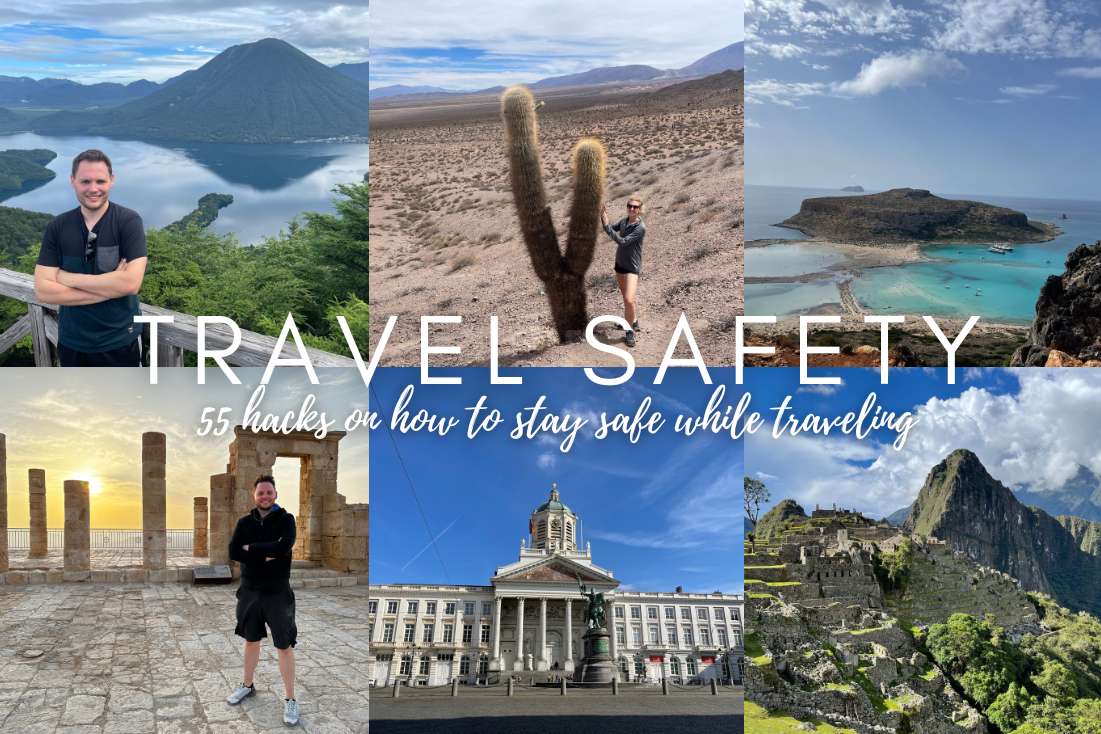
Traveling is about making memories, not police reports. Follow these tips and cautionary tales and remember to catch the right type of travel bug, not the one that “entertains” you during the entire airplane ride home (that was a rough ending to an otherwise fantastic Mexico trip!). So go out there and explore the world, but, you know, wisely.
We're talking about flying high without the turbulence of trouble, mastering the art of not turning your solo trip into a solo survival reality show, and learning to safeguard your precious passport like it's the last slice of pizza. And that no matter which part of the world you’re in, taxi drivers and car rental companies are the scum of society!
Whether you're a newbie setting foot in the unknown, a slightly aloof package tourist setting out independently for the first time, or a worried parent to a budding travel enthusiast, this guide is your golden ticket to staying safe, sane, and far from starring in your very own international incident.
Before you devour my safety tips and laugh at my travel mishaps, here are a few other travel hack articles that you may find similarly helpful:
21 Tips for First-time Travelers
25 Facts and FAQs About Travel Documents
10 Tips on Booking a Hotel Room Without Making Rookie Mistakes
And the best ways to stay safe while traveling are [imagine drumroll]…
Staying safe while traveling alone… or not alone
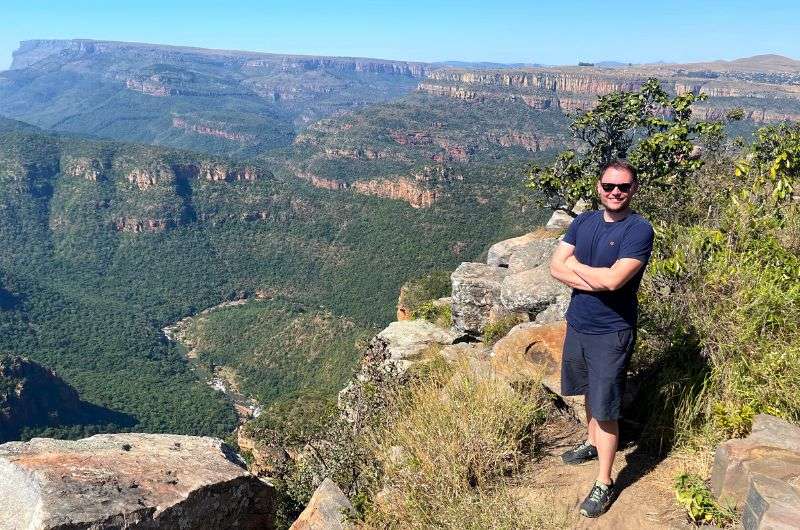
On some roads, you also have to be careful where you step. For example, like me here on the Panorama Route
Whether you're a solo wanderer or part of a pack, my main travel safety tip is: RELAX. They’re not out to get you and despite what the news makes it seem like, the world is your oyster, not your pissed-off three-headed dragon! Not being a total doofus is usually enough to stay safe while traveling.
But I'm guessing you came here for something a bit more specific than that, so here are my fool-proof safety tips, along with some “been there, done that” stories to drive some points home:
1. First of all, take travel advisories with a grain of salt.
Remember they try to cover all their bases, making the world seem like a dangerous place just so they can say “I told you so!” if you come back with an unfortunate experience. But let’s be realistic, most countries you’d wish to travel to are safe enough. You’ll be alright in Mexico if you don’t go on a quest to find drugs. You’ll be totally fine in South Africa unless you run up and down a side street in a township waving cash above your head. Basically, you’ll be safe traveling around the world unless you are an arrogant idiot.
Remember, in even the safest countries, the travel advisories will say something like “take normal security precautions”, making it sound like you’re supposed to have eyes on the back of your head and do that ridiculous thing where people wear their backpack as a frontback. Please don’t, not only does it look stupid, but you’re basically putting the biggest target on yourself, announcing “I’m a paranoid (American) tourist with lots of stuff you may want to steal right here!”.
2. The golden rule of safe travel is: Stay aware of your surroundings.
You’ve surely heard that nugget of wisdom before, but what does it even mean?? Well, just know where you are, where your stuff is, and who you trust, that’s all. Nothing complicated or magically life-saving about it—the goal is not to turn into a naive ninny just because you’re on vacation. You should notice if there’s a shady-looking fellow following you for the last 10 minutes, or that you happen to be strolling through Cape Town and suddenly there are no other tourists anywhere to be found (see below to know what to do when you are lost), and not everyone want to be your friend for the right reasons.
Just looking like you know what’s up can deter 90% of the bad guys. They are opportunists, after all.
3. Regularly check in with someone back home.
This is even truer for adventure travelers or those who aren’t just lying by the pool every day. Let friends or family know where you are and where you’re heading, and no, not just through social media updates. Posting photos after your hike is great for clout, but telling someone about your plans before you go can save your life in case shit hits the fan. Some places, like when hiking in South Africa, will have you sign a registration sheet at the start of the hike for this very reason—it’s easier to find lost folks if you have some idea of where to start looking.
4. Register into a travel emergency database.
Some countries have a system set up where you can register before you travel, so in case of an emergency in the country you’re going to, you’ll get information from your embassy and can be contacted and accounted for. Others open registration only in an active crisis. It's useful to find this information before you actually need it, so before travel seems like a good time. For example, in the United States, use STEP, and in Australia, you can subscribe to travel advisories from the Department of Foreign Affairs and Trade.
5. Who ya gonna call in case of an emergency?
Here are some emergency numbers around the world, but always make sure to check and memorize the one in the country you’re visiting. They often speak English, too, so you should be able to get by even as a foreigner:
- USA: 911
- EU: 112
- UK: 999
- Australia: 000
- Japan: 119 (super confusing if your own emergency number is 911!)
6. Keep important contact numbers handy.
Who's important? Your embassy, your airline, a healthcare provider you can’t live without, your overprotective mom. Also, remember it’s really hard to check your phone for these when your phone has just been stolen, so sending yourself an email with important numbers or writing them down on a piece of paper that you keep in your suitcase can come in handy.
Extra safety recommendations for lone travelers:
7. Stay in well-reviewed accommodations.
I always stay in hotels with at least an 8.5 rating on booking.com, not just for safety reasons but also for I-hate-bad-hotels reasons. Don’t be cheap or too hippie when it comes to choosing the place that’s supposed to keep you safe at night. A well-reviewed hotel gives you a good amount of assurance that others have made it out alive. And as a bonus, you’ll probably avoid staying in a place that not only doesn’t change the bedsheets between guests, but also refuses to change the bedsheets or give you back your money when you call them out on it! God, Georgia has some fine mountains and monasteries, but sheesh I really hated the services... and people. Sorry, not sorry, this country was epically frustrating!
Just a heads up: If you make your booking.com reservations through any of my links, you’ll not only sleep well because of the good reviews your hotel has, but also because you tipped me for all my hard work on this blog (actually, booking.com tips me, so there’s no extra cost to you). Thanks, friend!
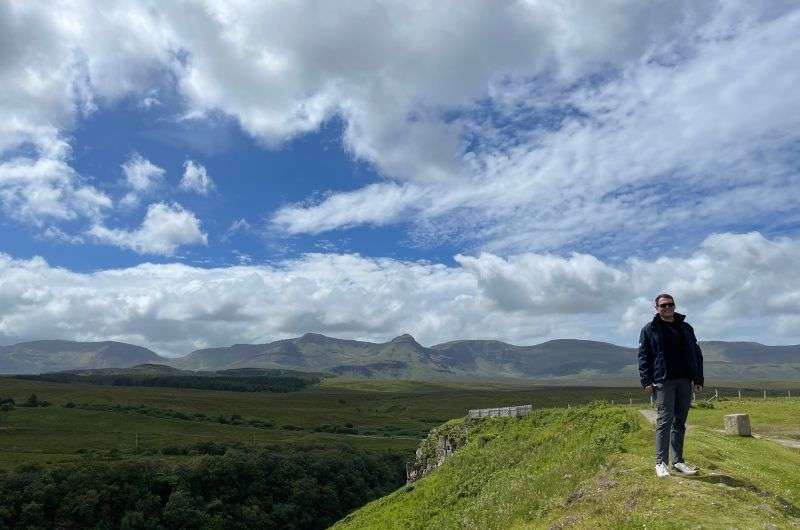
Although I don't prefer it, traveling alone has its own magic—and the views of the Isle of Skye will take your breath away regardless!
8. Avoid arriving in new places at night.
It’s much harder to figure out your way around a new place if you a) can’t see it and b) are too tired to see straight. If you can’t help it (they won’t change flight times for you, eh?), have a reputable ride to your hotel lined up.
Your hotel can send someone who will wait for you in the airport arrivals hall with a cute little sign with your name on it, making you feel like a celebrity. And the driver will for sure know how to get to your hotel, which, believe it or not, is not automatic. “I’ll just take the airport taxi” isn’t the best game plan if you arrive in the middle of the night, want to be safe, and don’t want to deal with taxi drivers (they’re a scammy nuisance all over the world!) with your tired travel brain.
9. Don't overshare with strangers.
Your life story and travel itinerary should not be public knowledge. Heck, even letting everyone around you know that you have zero travel companions to help you out in case of trouble should be privileged info in some cases. I guess if you’re a huge guy traveling alone, it’s ok if your new buddies catch on, but the same isn’t true for a female on her own.
10. Stay sober, at least most of the time.
If you’re on the young and wild side, always expect someone to throw something into your drink if you’re out with new “friends”.
It really happens, it’s not fun, and it doesn't just happen to girls. I know because I know—and I’m really glad that the friend in question is a pretty big guy and not a dainty little lady. It still wasn’t fun not knowing where he was half of the day, him not remembering where he was for half of the day, and finding out his new iPhone was gone once he snapped out of it on the side of a road.
Getting lost while traveling: Not all who wander are lost, but you might be
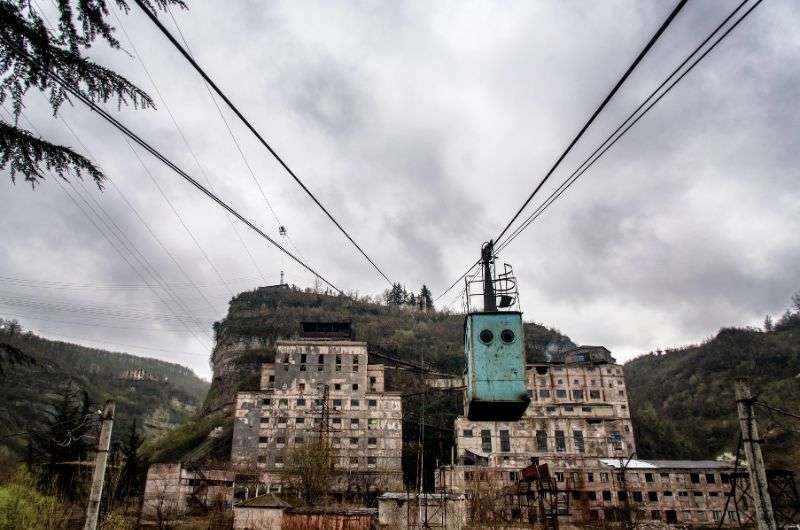
Imagine getting lost in this Zombieland aka Chiatura in Georgia
Getting lost can be an adventure, but let's make sure it's the fun kind, not the 'missing person' kind. Here are some tips to stay found:
11. Have an offline map.
You can get Google Maps offline for your basic sightseeing needs, but for hiking and nature walks, Alltrails is my all-time favorite. For cycling, and in some countries, like Austria, I prefer Kamoot. Just make sure your phone is always charged—it's no use having all those maps stored offline if your phone dies in the middle of nowhere.
You’ll want these offline maps handy not because you forgot to get yourself a local SIM card like I recommended (Further reading: Staying online when you travel), but simply because there just may not be any reception while you’re in the middle of the mighty Drakensberg in South Africa. Even in places that sound like they’d be covered by signal, they always aren’t, like in Greece—not only was there zero reception in the Agia Irini Gorge in Crete, but Alltrails lied about the hike length! Luckily, you can get bad Greek beer at the end, but sheesh, I wouldn’t want to be stuck there without a map, that’s for sure.
12. Keep a business card from your hotel.
It's your 'get out of jail free' card when you need to ask for directions and aren’t so good at it. This is doubly true in countries where English isn’t widely understood and you can’t read their writing if your life depended on it. You’d be surprised how many taxi drivers also have no idea where they’re going unless they get step-by-step instructions. Not everyone is going to understand your attempt at pronouncing your hotel name, let alone know how to get there.
Trust me, traveling in Vietnam, when you’re standing in the middle of what you swore was the street your hotel is on, with scooters zooming past and that over-friendly Bahn mi lady trying to sell you lunch for your entire extended family, you’ll be happy to have a useful little cheat sheet from your hotel on you at all times.
13. Embrace getting lost.
I stay far away from off-the-beaten-path destinations if I can help it and rarely get lost, but hey, it happens. Getting lost or taking the wrong turn can end up with you getting an unexpected cultural experience, like stumbling over a wedding in Namibia or being invited to a nighttime celebration at a local temple in Vietnam. Just make sure that path leads back to civilization and not down a dark alley in Lima—that’s a cultural experience nobody needs.
Staying safe while flying: Because turbulence isn't the only thing to worry about
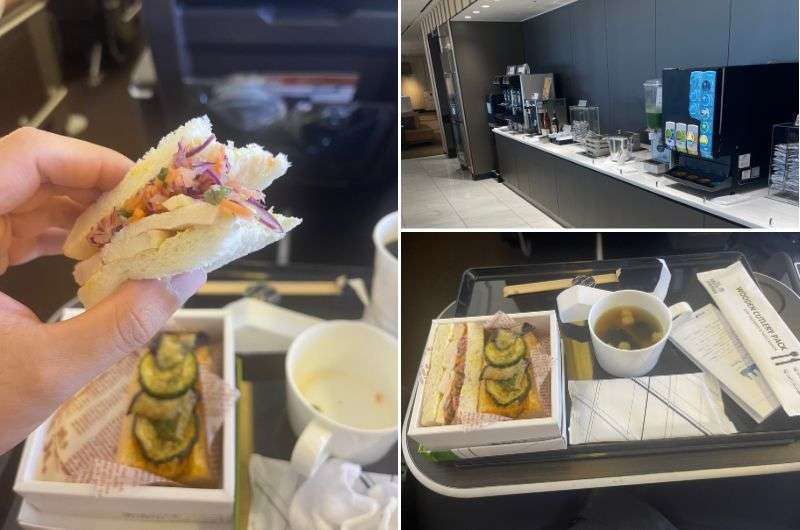
If you want to feel safe while traveling, choose companies with quality service such as Ana Airlines Premium Class
Flying can feel like you're in a metal bird at 10,000 m/35,000 ft, but let's keep it from turning into a thriller movie. Plane travel has its own set of safety issues, and none of them are associated with the plane crashing to the ground—leave those worries up to the pilot.
Here are some tips to make sure your flight is as smooth as silk:
14. Don’t act all weird at airport security.
Security agents look out for behavior such as excessive yawning, staring at the floor, fidgeting, or rummaging around in your bags too much to find suspicious individuals. If you’re a nervous flyer, being questioned as a potential terrorist won’t help calm your nerves, so try to chill. Read further: Getting through airport security | Flying for the first time (includes tons of airport tips)
15. Don’t leave your bags unattended at the airport.
This is not just because of the risk of them getting stolen or loaded with someone else’s drugs, but mainly because your bag will be seen as a security threat. You will get the stink eye from security, get called out over the loudspeakers, and be made to feel like an idiot with everyone at your gate watching.
16. Keep an eye on your belongings, especially in crowded areas.
That guy bumping into you might not be clumsy; he might be crafty. This isn’t true just in the airport but anywhere on your travels in general.
17. Any type of request to transport anything on a plane should be considered suspicious.
The answer is always a hard "NO" because you don’t want to be busted for your attempt at a crime. Don’t “help” anyone out by taking their bag to another country unless it’s your mom and you know for a fact she’s not a drug lord.
18. On the plane, use those overhead bins wisely.
A falling suitcase is nobody's idea of in-flight entertainment. Also, it’s not a flight attendant’s job to pick up your heavy bags, so only pack as much as you can safely lift. Nobody needs three books in their carry-on.
19. Read up on prohibited items.
Know what you are and aren’t allowed to bring into your destination country (or out of it… coca is apparently not a great souvenir option in Peru). You don’t want to be taken to one of the small rooms at the airport.
20. Keep important things in your carry-on.
Keep your important stuff with you in your carry-on. That means passports, money, and, yes, your favorite snacks. They always promise to take good care of your checked bags, but every once in a while, your suitcase may go MIA for a while. Make sure that you have all important travel documents, essentials, and things you can’t travel without in a personal bag. Further reading: Packing for international travel | How to pack a carry-on
21. Stay hydrated.
A plane’s low humidity can not only make you feel as dry as a raisin, but that, along with the different cabin pressure, can really leave you feeling rough after a flight. Sometimes, your body may even get confused and think you are sick, resulting in you actually feeling sick. Remember to hydrate inside and out, meaning you may kill for some hand or face lotion and lip balm a few hours into your long-haul flight! Your skin will thank you.
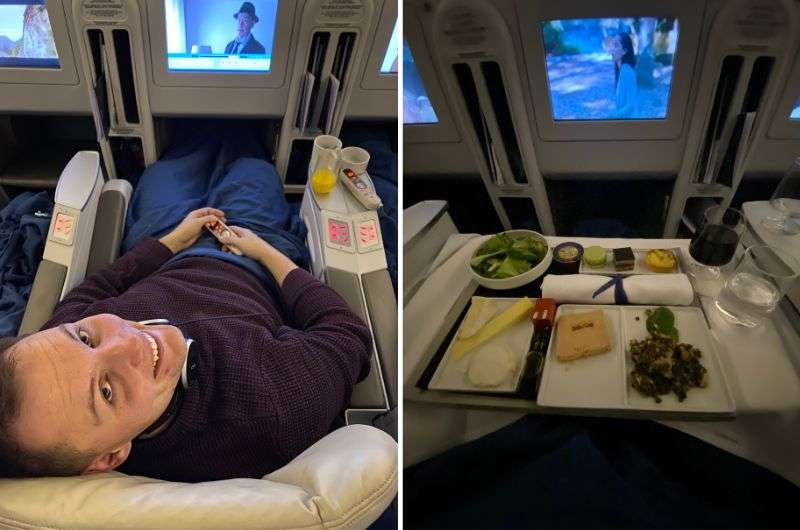
Flying is fun If you choose your airline company right. I'll be that love and give you all the hints you need to know if you haven't flown yet.
22. And let’s not even get started on all those viruses floating around the cabin.
If everyone could just hold their breath for a few hours… You can use a saline nasal spray to help prevent those suckers from getting you sick, plus it easier to breathe on a plane without dry nasal passages. Bring along sanitizing gel or wipes to clean off surfaces around you so you don’t feel icky touching the armrest. Cooties, you know? Oh, and don’t roll around your hotel bed in your airplane clothes, and take a shower asap. Again, cooties.
23. Go easy on the booze.
Flying's dehydrating enough without adding a hangover into the mix. Annoying fellow passengers by being too loud or jovial could also get you into serious trouble on the plane. Plus, if you happen to have one too many glasses of [drink of choice] before you board your flight and the gate agents don’t like the look of ya, guess who’s getting thrown off their flight?
24. Avoid fines and fees.
Though not a safety hazard, it’s certainly good to be aware of things that could rack you up a fine or punishment while flying to or from vacation. For example:
- Excess bag fees: too many bags, heavy bags, or bags over the size limit
- Checking in at the airport when you were supposed to check in online
- Bringing too much alcohol or tobacco or certain plant and animal products
- Administrative errors: spelling mistakes in your name on your plane ticket
- Overstaying your visa/visa-free time or missing entry or exit stamps
Renting a car and driving while traveling: Because public transportation is my idea of hell
I always rent a car when I travel, but it comes with its fair share of annoyances. I have a whole article on renting cars around the world, but here are some of my top travel driving tips:
26. Not all roads are created equal.
Be ready for potholes and inconsiderate drivers mixed with expensive road fees, depending on the country you’re going to. For example, in Mexico, you have to decide between using the terrible local roads or the great but very expensive highways. In Italy, you may want to save yourself some time (and car sickness) in the Alps and pay for the highway instead, but then you miss your exit and end up paying something ridiculous like EUR 20 for that little mistake. In Peru, tolls are also everywhere, and a big tip from me: always have cash on you! A guard at a toll gate actually forced the 10 cars behind us to back up and had us turn around and drive ON THE HIGHWAY in the wrong direction until we could exit to the nearest ATM to get cash. Boy, was that exciting!
27. Driving can be an action-packed adventure if the local drivers are nuts.
Prepare for it mentally and just take it as part of the cultural experience. Peruvians are some of the kindest people I’ve met, but boy do they drive like madmen! Roads aren’t exactly the best quality, either. And don’t attempt to drive in Lima unless you want to shave off a few years of your life. Then there's Italy, where every driver is apparently late for an extremely important date. Turn signals? Pfft, they're just fancy car decorations!
28. Sometimes, the roads will be really bad, but the drivers will be very considerate.
A combination like this will make it still ok to self-drive. Like in Namibia. I can’t imagine non-stop offroading, staying on the left, taking forever to get anywhere, staying off the roads at night, dodging zebras, and dealing with idiot local drivers! In Scotland, the roads are actually mostly good and even come with a special anti-slip surface that is a godsend in the awful weather, but dealing with single-lane roads and a million roundabouts while driving on the left?! Not an easy task for a lot of tourists. Luckily, Scottish drivers are lovely and forgiving.
29. Don’t prepay for your rental car.
Car rental companies are some of the scammiest scammers out there. Sure, you’ll probably save a few bucks if you do (if you actually get what you pay for in the end), but you could be sorry for being a penny-pincher pretty quickly. Paying upfront gives the rental company an easy way to scam you—” Oh, we’re so sorry, we’re unexpectedly out of all the normal cars, but would you like to pay a ton extra for a Hummer or take this old Ford instead (no discount though, of course)?” True story. A frikin Hummer! Just imagine me rocking up to some Inca ruins in one of those.
30. Big-name car rental companies aren't always the best.
In some countries, like Mexico, it’s best to stick with international rental car companies like Alamo, Hertz, Avis, and Enterprise, to have at least some chance of a fair deal. But in others, the big brand name is just a lousy excuse for poor service. In Scotland and Peru, local rental car companies were the best way to go. My best advice is to always read reviews specifically for the country you are visiting and don’t automatically go to the big brands hoping for stellar service. They can be about as trustworthy as taxi companies, i.e. not.
31. You probably don’t need a 4x4.
...even if the rental car company swears on their mom’s life. Even in places like Scotland and Chile, which are known for their rugged beauty (much like myself) and epic nature trails, you’ll be fine with a 2WD. 4x4s are always more expensive, and in countries where renting a car already costs a bazillion, you’ll want to be smart and only get the extra power when you really need it. In Peru and Namibia, the opposite is true—4WD is the only way to go.
Keeping money and valuables safe while traveling: How not to finance a thief's vacation

Beware of pickpockets, especially if you are in touristy areas such as Topkapi Palace in Istanbul
Unless you’re on a package tour where you’re paid for everything up front and you’re always under the watchful eye of a guy with an umbrella and a microphone, you need to keep in mind safety precautions that will keep your money and valuables safe on the road. (Further reading: Why opt for independent travel vs package holidays)
Here’s what to keep in mind as far as money matters:
32. Don't bring what you can't afford to lose.
Simplicity is your new best friend. The most foolproof way of keeping valuables safe is to not bring them at all. It’s less stress, less risk, and less dealing with completely useless police in a language you don’t know. You can enjoy a fancy dinner in South Africa and not wear your grandma’s pearls.
33. Make a conscious decision on where you're leaving your valuables.
Weigh the risks of the country you are traveling to: will your stuff be safer if left in the hotel or will you rather keep it with you? If you’re traveling with a laptop, you better be staying at a good hotel where the staff doesn’t have sticky fingers, the doors actually lock, and the hotel safe isn’t just a simple way of telling bad guys “This is where I keep my expensive shit”.
34. You don’t need to be in a third-world country to get your money taken.
It's the way they do it that differs from place to place. Heck, Europe is the world capital of pickpocketing, and you’d think we’re all nice and sophisticated here! Italy, France, Germany, Greece, and the Netherlands are consistently in the top spots of pickpocketing statistics. (Further reading: Tourist scams and traps to avoid). Keeping your wallet in your back pocket isn’t the best idea for obvious reasons, and putting your bag on the ground next to your table at a restaurant isn’t either. One well-trained “stumble” and a coat draped over their arm to cover the loot is all it takes for someone to snatch it from you.
35. Don't flash your cash or bling.
Being a tourist is usually already enough to make you look like a walking bank account. In places like Mexico, you’ll see a clear divide between the two classes—everyone is either very rich or very poor. If you look like a money tree, you will be seen as a money tree, inviting all kinds of unnecessary attention and possible danger, too. You can be as rich as Rockefeller and still remain relatively incognito simply by wearing unremarkable outfits, zero expensive jewelry, and not doing anything stupid like talking about how much you got from the ATM this morning. (Though after we had to walk around with a literal backpack full of paper money in Argentina—thanks, inflation!—it was hard not to talk about it!)
36. Multiple cards, multiple spots.
Make sure you have more than 1 way to access your finances when you’re traveling, and keep those ways separate from each other. There’s no use in having several credit cards if they all get stolen at the same time. The same thing goes for your money—after you withdraw money from the ATM, spread your wealth. Not talking about unfair distribution of taxes, but rather keeping some money in your wallet and some somewhere else in your bag, for example.
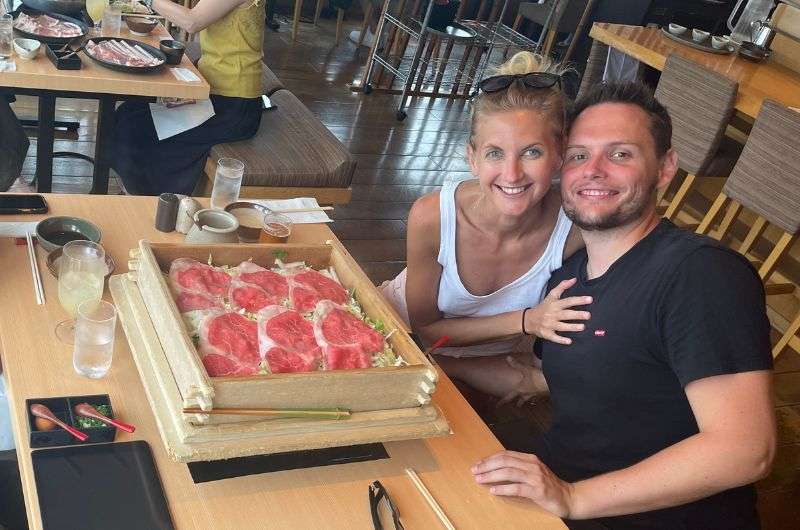
Did you know that in Japan, it's more common to pay by cash than by card?
37. Set up card limits before you travel.
That said, also make sure that you set withdrawal and payment limits on your cards to prevent excess loss if a theft does happen, and—this is for you, grandma—never ever write down your PIN codes and carry them with your cards!
38. Don't withdraw money just anywhere.
ATMs attached to banks or those that belong to reputable companies are your safest bet. The ones in dark alleys? Not so much. You can get mugged, your card can get eaten by the machine with no help nearby, or you can end up paying an exorbitant withdrawal fee.
39. Your own bank might be charging you high fees.
Don’t forget that not only the foreign ATM bank but also your own bank can charge you for using an ATM in another country. Know this information before you travel to avoid any post-vacation surprises on your bank statement. And if your bank does charge you an arm and a leg, it’s time to get a new bank! Frequent travelers need fee-less credit (debit) cards!
40. Avoid currency conversion fees abroad.
In most cases, when withdrawing money from ATMs and when paying by card, choosing to pay in the local currency will give you a (sometimes much) better exchange rate than if you let them convince you to pay in your currency. It may sound tempting but don’t do it. This way, your bank—not the foreign bank—is the one doing the converting, and it should work out much better for you.
41. Keep your cards in sight at all times.
If someone wants to take it away for a 'walk', say no. Restaurants in some countries take your card away from the table, charge you at the register, and then bring it back. If you chose a shitty restaurant or just don’t feel good about the situation, pay in cash or chaperone your card.
42. Inform your bank about your travel plans.
Otherwise, your bank may see all this sudden foreign spending as a sign that your account has been hacked. A blocked card in a foreign land is no fun.
Keeping your passport safe while traveling: Keeping your ticket home in one piece
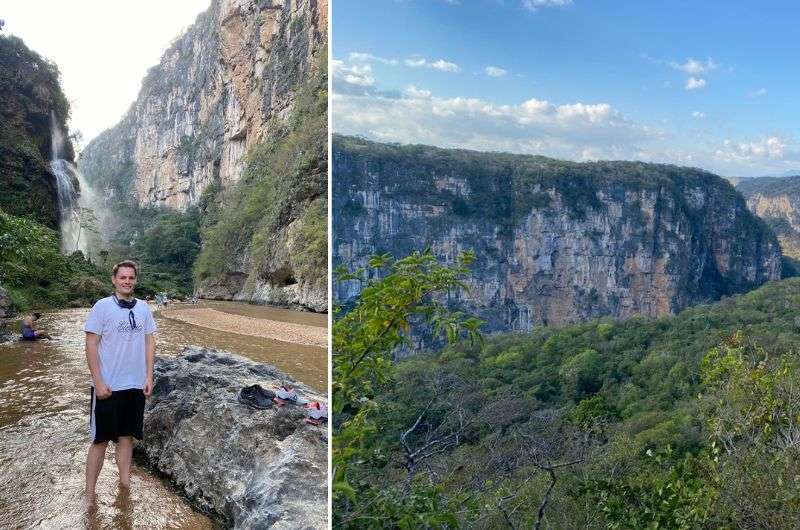
The only time I felt slightly nervous in Mexico was when dealing with the police. Otherwise, all is well, safety-wise! I've put together my all tips on safety in Mexico so you know what to expect
Some people would tell you to keep your passport at your hotel. I am not some people. I say don’t leave anything behind if you aren’t ready to part with it. I recommend keeping your passport with you when you’re out and about, and not just because you don’t trust your hotel: some tourist sites require ID, some tickets to popular places will be in your name specifically and your identity will be checked before letting you in.
Of course, if you travel to a mugging-heavy destination (why?!), you’ll need to weigh your options. If you’re in a more dangerous destination, stay in a top-quality hotel and leave your passport in the safe. Book your hotels on booking.com, and yes, this is me plugging my affiliate link (but it won’t cost you anything if you use it, so it’s a win-win, right?).
My top tips on keeping your passport safe:
43. Keep it on you, but hidden.
A 'secret' pocket in your backpack is the perfect spot for a passport.
44. A good hotel can do wonders for your safety.
If you're in a sketchy destination, a reputable hotel safe is your friend. Otherwise, I like to always keep my passport with me.
45. Passport covers are cool.
Dirty or wet passports aren’t “unsafe” per se but getting stuck at immigration because of it definitely is a travel pooper.
46. Copies, copies, copies.
And have them with you for situations where you’re required to leave your passport in the care of others.
47. Have a scan of your passport available online.
This is imperative in case these safety tips don’t help and your passport gets stolen or lost and you need to start the process of getting a new one (and making a police report).
48. Knowing where your passport is is the first step.
Have a 'passport spot' so you always know where it is (and don’t forget it in the hotel safe despite me telling you not to keep it there).
49. Check the expiration date on your passport well before you travel.
Not a safety thing really, but it could ruin your vacation before it starts. A lot of countries require your passport to be valid for a minimum of 3–6 months after the dates of your travel, otherwise, you aren’t even getting on the plane. Read more: 25 Facts and FAQs about Travel Documents
Getting sick while traveling: Because 'travel bug' shouldn't be literal
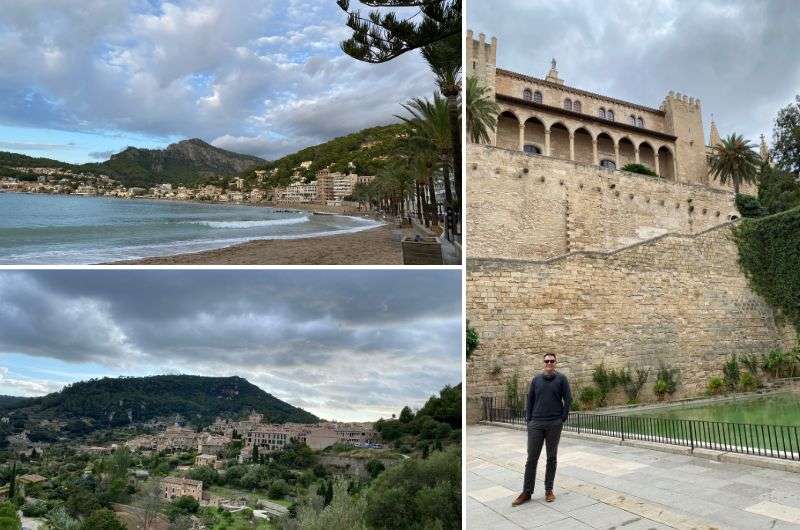
Imagine going on a dream holiday to Mallorca and getting sick there...you better be prepared and minimize the chances of that happening
Nothing puts a damper on a trip like getting sick. Here's how to avoid bringing back souvenirs in the form of illnesses:
50. Avoid tap water if it's questionable.
In some places, you shouldn’t even brush your teeth with the tap water, and sing in the shower. Maybe stick to humming. Do your research beforehand to avoid throwing up 157 times on your flight back from Mexico to Europe. True story (though it could’ve been the food, who knows).
51. Pack a mini first-aid kit.
Include the essentials like painkillers and fever relief, your allergy medicine, and your favorite placebo. Obviously, there are pharmacies in all countries, and you may even get the best, most effective stuff locally, so don’t go crazy on the packing. If you’re traveling to more adventurous places, it’s wise to visit a travel doctor to stock up on things like anti-diarrheal medicine and even antibiotics if the country you’re visiting isn’t the best at health issues.
52. You got your shots, right?
And I’m not talking tequila. Typhoid, Hep A+B, malaria, rabies? Again, travel doctor, or Google at the very least… and then travel doctor. Remember some shots need multiple doses prior to travel, so you’ll need to plan to allow yourself enough time to get them.
53. Eat where the locals eat.
If it's packed, it's probably safe (and delicious), because the food doesn’t sit around long enough to go bad. Better yet, check reviews on Google Maps and choose the best establishments. Not every expensive place is safe, and not every food stand needs to be avoided.
54. Listen to your body.
Feeling tired? Rest. Feeling adventurous? Still, rest. Traveling is hard on your body, so make sure to get enough sleep, eat well, drink water, and take it easy once in a while.
55. Wash your hands.
It’s obvious, but if you want to stay healthy while traveling, make it as hard as possible for germs to get you. You may want to keep sanitizing gel on you, especially in places where you’ll be eating with your hands, shaking a lot of hands, or touching things lots of people touch. Tell me you’re a germaphobe without telling me you’re a germaphobe.
Remember, folks, travel is about fun, discovery, and not ending up in situations that require an international rescue mission. Stay smart, stay safe, and go make some awesome memories!
This post contains affiliate links. I earn a small commission if you make bookings through my links, at no additional cost to you. This helps keep this blog free, thank you!


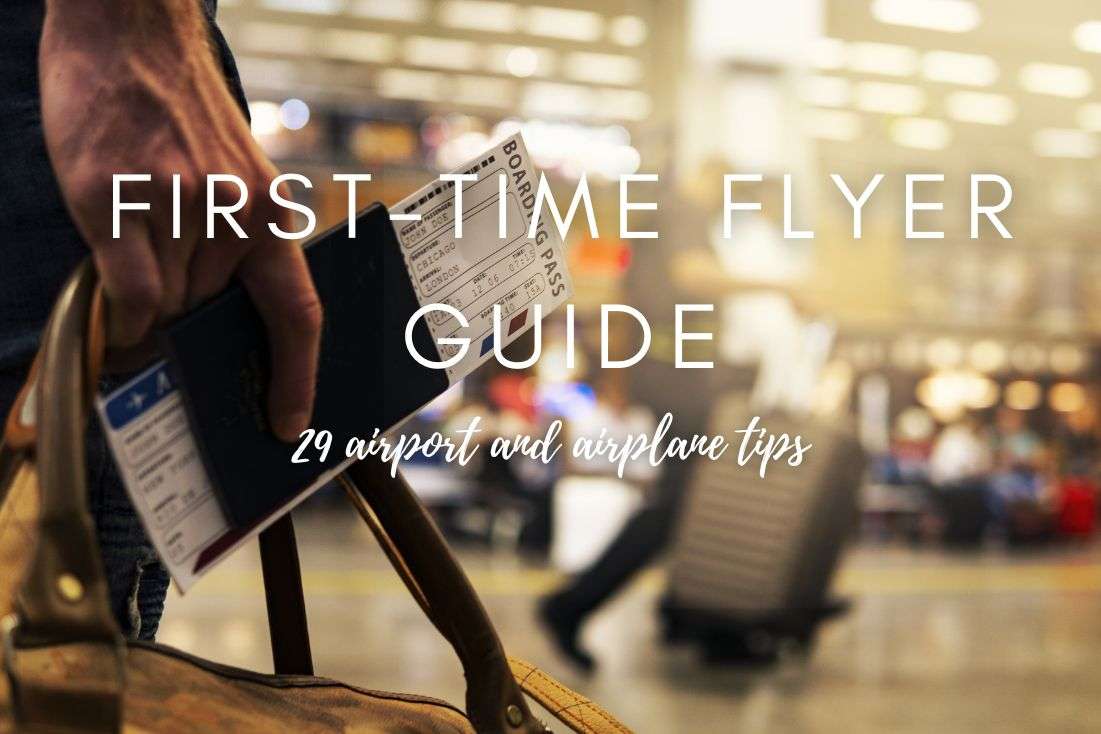







Comments | Thoughts? Give us a shout!